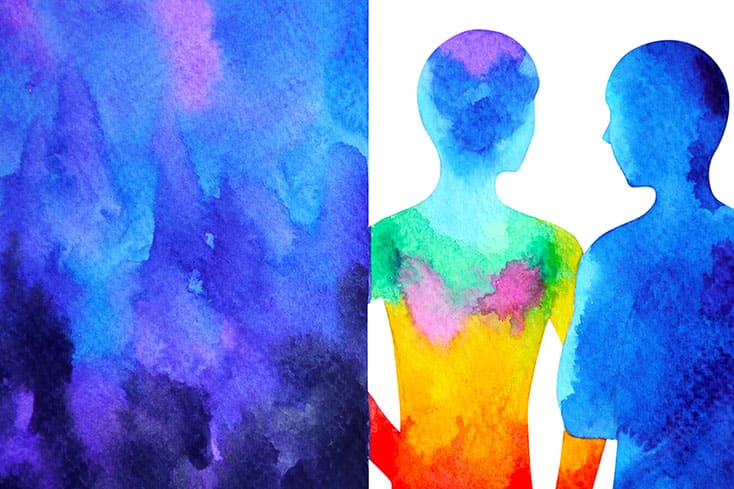July 14, 2021
By Lexie Manion

In recent years, I have come to identify as “somewhere around bisexual or pansexual,” although honoring what I feel is more important to me than the label. Accordingly, I now understand the importance of coming out and the Pride celebration that comes along with it. But for me, Pride goes beyond a month-long celebration of my orientation.
The pride I feel about my identity is inextricably linked to the pride I feel about being in recovery from an eating disorder.
I Battled a Cycle of Control and Shame
During my past eating disorder struggles, I restricted my food intake and praised myself for skipping meals. Eventually, my behaviors escalated to a compulsive “restrict-binge-purge” cycle. These behaviors persisted from my teenage years into young adulthood. I have been in recovery for the last few years now.
Each disordered behavior addressed my feelings of inadequacy. When I felt out of control and unable to express myself — a frequent occurrence — restricting made me feel powerful and fully in control. It also left me feeling exhausted, dull and ravenous. In response, I would binge eat. After binging, the anxiety and desire for control returned. Finally, purging gave me a release, making me feel calm and elated.
In some ways, I replicated this cycle when dismissing my sexual identity. I restricted who I was, binged on my self-denial that I felt attracted to any gender, and purged the love and acceptance I so desperately craved because I was not ready to come out.
Ultimately, when I was engaging in disordered eating behaviors, I was avoiding the shame I felt — shame about past mistakes, my body, my mental illness and, perhaps most of all, my sexuality. I used my disordered eating to numb any discomfort I was feeling — but in “numbing out” these moments of pain, I numbed everything else. I became a shell of who I was.
Treatment Forced Me to Confront My Denial
Like the eating disorder, pretending to be straight was a façade. In art therapy, at one of the eating disorder treatment facilities I attended, they gave us white masks to decorate. I adorned the outside of my mask with bright colors and positive affirmations like “stand tall,” while I painted the inside dark and added cynical words.
The stark difference between the inner and outer surface of the masks, we learned, can represent how we try to present ourselves to the world versus how we really feel inside. This distinction is especially relevant to people struggling with eating disorders, as we tend to hide our struggles due to shame.
When I took off my mask and revealed what I had been struggling with all along, my therapists were able to better understand my needs. Similarly, when I took off my mask, and revealed my sexuality, my friends were able to better understand and accept me. While these moments of realization and disclosure were uncomfortable, they gave me an opportunity to unpack the narratives I had created about myself and begin to heal.
To Recover, I Needed to Embrace My Identity
When I learned how to sit with my discomfort, I began to untangle the knots that shame tied in my stomach. Underneath that shame was a feeling of unworthiness and deeply internalized self-doubt.
In working on being non-judgmental with myself, I opened the doors to recovery and embracing my sexual orientation. It has taken time to heal the torment I put myself through, but I am proud of the work I have done.
I firmly believe that one of the bravest things we can do while in the waves of shame is to reach out and be open to accepting help.
I Gained a Freedom I Never Imagined Possible
Being in recovery, and being open about my sexuality, has given me a freedom I never want to take for granted. When I suppressed my true self, I was at war with my body. I had no capacity to accept any part of myself, let alone love myself. In being open about who I love, I have also found self-love. I am gentle with myself and practice self-compassion in the same body I used to look down upon and hate.
The self-hatred I felt kept me perpetually helpless in the quicksand of shame. I kept sinking and sinking, until finally, love prevailed. A rainbow flag was the life preserver my friends sent out for me. I firmly held onto the flag and it pulled me out.
Of course, coming out about my sexuality and my eating disorder left me exposed and vulnerable. However, soon after the feeling of nakedness dissipated, the encouragement from my friends and community made me feel at home.
As I made peace with my identity, I made peace with my body.
Lexie Manion is a writer, artist, student and mental health advocate. She writes about mental health and body acceptance topics while sharing her personal story of recovery. Lexie is currently studying to become an art therapist, and she strongly believes art and writing can be healing. You can find more of her work at lexiemanion.com or follow her on Instagram at the handle @lexiemanion.
Submit To The NAMI Blog
We’re always accepting submissions to the NAMI Blog! We feature the latest research, stories of recovery, ways to end stigma and strategies for living well with mental illness. Most importantly: We feature your voices.
LEARN MORE